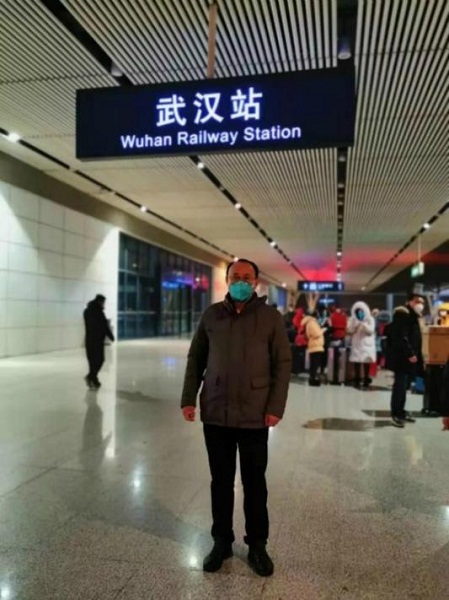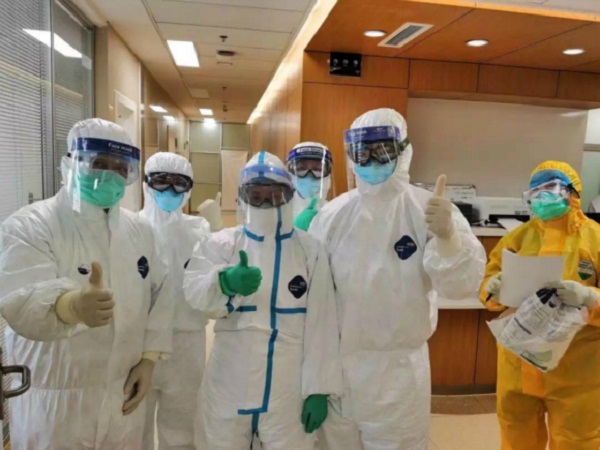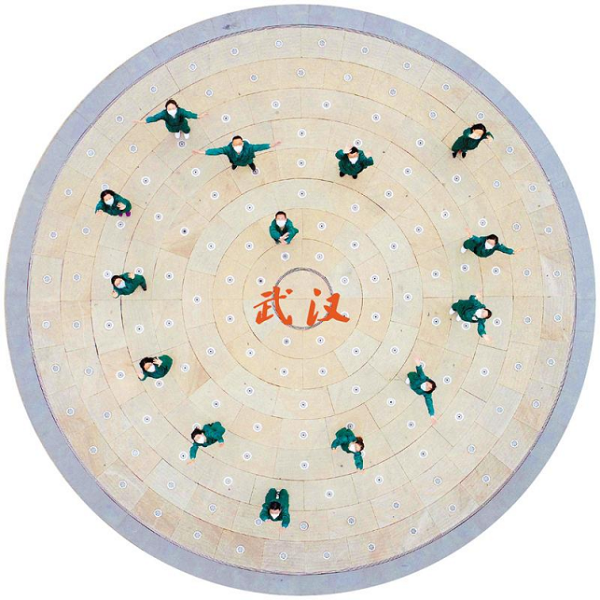
Wu Xiaolong, leader of Wuxi's first medical support team to Wuhan, arrives at Wuhan Railway Station at 23:30, Jan 25. [Photo/people.cn]
"I just arrived in Wuhan safe and sound, and I expect to leave in good health," Wu Xiaolong, a doctor, posted on social media upon his arrival in Wuhan in Central China's Hubei province. Wu traveled to the city to help in the fight against COVID-19.
Wu is director of the infection management department at the Affiliated Hospital of Jiangnan University. He led the first team of 28 medical workers from Wuxi, Jiangsu province to support Wuhan.
During their 53 days in the city, which was the most heavily hit by the epidemic, Wu and his team shared diary entries and poetry amongst themselves, patients, and social media in order to keep morale high.
Actually, they began sharing even before their arrival on Jan 25. WeChat and QQ groups were set up by Wu to prepare his team for what was coming. The members, many in their early 20s, were asked to keep a diary.
"Every bit counts. A diary will not only help with stress, but also serve as a record for you and the people around you," said Wu.
"Jan 27: We were officially stationed at the First People's Hospital of Jiangxia District after eliminating cross-infection risks."

Wu and his team maintain a positive attitude despite the challenging prevention and treatment work. [Photo/people.cn]
"Jan 28: This is our fourth day in Wuhan. We have been treating confirmed cases and training newly arrived volunteers, including four fellow workers from Wuxi."
"Jan 29: We just moved into another battleground—the Jiangxia District Hospital of Traditional Chinese Medicine —this afternoon. Everything seems to be going smoothly."
The efforts of Wu and his team paid off. All of the 289 patients treated by the team made full recoveries, and no one on the team was infected.
Local media and young patients maintained close contact with Wu. Wu maintained close contact with local media and young patients. His stories were printed on the front pages of newspapers and in short videos on Douyin, the Chinese version of TikTok, where they served as a source of inspiration for many.
Back on Jan 25, inspired by Zhong Nanshan, a renowned respiratory scientist who made major contributions to the fight against the virus despite being 84 years old, Wu wrote a short piece acknowledging all medical personnel who left home for the frontlines during the spring festival.
"You gave up the chance to reunite with your loved ones; You stayed strong when confused; You stood firm when shaken…you are kind and steadfast; You are sure to see the light of victory," translated from the Chinese poem of Wu.
On the morning of March 16, Wu wrote a fifth piece of poetry to pay tribute to all the patients in their district that had recovered. At that time, there were no more existing cases. "Day and night, we remain fearless in fighting COVID-19 and are eager for a resounding victory," Wu wrote.

Photo taken on March 16 shows Wu's team standing in the shape of a heart to celebrate. [Photo/people.cn]
"The poems I wrote mark the key moments in our fight in Wuhan and symbolize my determination to overcome all obstacles," said Wu. "I am a warrior on a battlefield, a doctor who saves lives, a Party member who remembers his duty always, and a leader who meets challenges head on."
At a lecture in Wuxi on April 29, Wu looked back on his memorable 53 days and told attendees that, though the epidemic is still spreading around the world, final victory will come as long as people unite and follow government's prevention and control measures.





